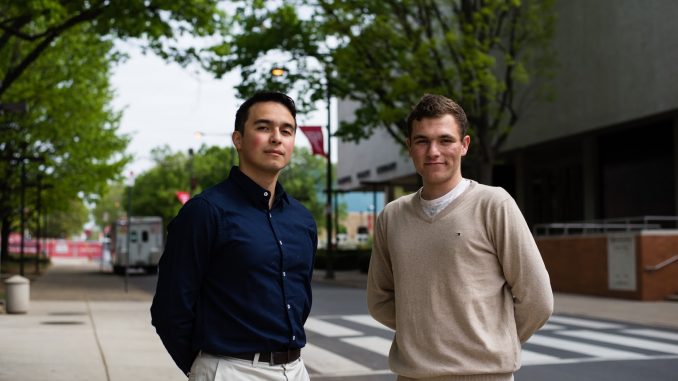
After their own experiences with immigrating to the United States—learning English as a second language along with adjusting to American culture—Jose Francisco Calva Moreno and Daniel Gritsyuk wanted to find a way to help immigrants in situations similar to their own.
This semester, co-presidents Calva Moreno and Gritsyuk officially launched their new student organization Temple University Students Teaching Underrepresented Developing Youth, or TU STUDY. The organization offers academic assistance and mentoring to underrepresented minority students whose first language is not English.
“When I first got to America, I was 15 years old. My English was basic and I had to spend six months in ESL. It was very rough,” said Calva Moreno, a junior biochemistry major who immigrated from Mexico. “There were a lot of people along the way, especially teachers, and some volunteers that made a difference for me to understand not only the language, but the American culture. It really helped me, so I felt kind of the need to give back what was given to me.”
Gritsyuk, a junior neuroscience major, moved to the United States at a younger age than Calva Moreno, but still understands how tough assimilation could be for immigrants.
“I’m a first-generation immigrant, and my family came from Ukraine,” Gritsyuk said. “I came here when I was 2 years old, and I also had to get English lessons because I don’t speak any English at home.”
“Many of them come here when they’re much older than I was, so it’s even harder for them,” he added.
TU STUDY provides general tutoring for students between kindergarten and 12th grade. The organization’s 13 volunteers commit time each week to helping students with their schoolwork, and even help older students with college preparation and applications.
In addition to assisting K-12 students, TU STUDY offers ESL training to adults. Its volunteers speak a variety of languages, like Spanish, German, Russian and Hindi. Their main focus at the moment, however, is with the Hispanic community because they make up a majority of students, Calva Moreno said.
Timur Rusanov, a sophomore neuroscience major and TU STUDY volunteer, joined because he felt he could offer the help he gives his parents to other students as well. His family immigrated to the United States from Uzbekistan, and he said his parents sometimes still struggle with speaking English.
While it’s beneficial for volunteers to be fluent in a second language, it isn’t required. But each volunteer must have general legal clearance to work with children.
The organization is affiliated with the Queen of the Universe Catholic Parish in Levittown, Pennsylvania, where Calva Moreno is a parishioner and choir member. Its volunteer work originated in schools within the Philadelphia suburbs this past February, like Levittown’s Holy Family Regional Catholic School.
Since then, TU STUDY added one Philadelphia school to its roster, but has not begun its services there yet. The group has been limited on time this semester after only starting in February, but hopes to accomplish more next semester after events like Welcome Week bring in more volunteers.
Despite being fairly new, TU STUDY has seen success so far. Each week, it has had a consistent turnout with students coming to get tutored, Gritsyuk said. An example of this success is Rodolfo, one of their adult ESL students. Volunteers started out with lessons in Spanish seven weeks ago, and have been speaking to him in English for the past two weeks.
In addition to general academic assistance, the members of TU STUDY want diversity to exist, Calva Moreno said. He feels new immigrants give a special contribution to American culture through their own culture. Additionally, they want to encourage students to strive toward their fullest academic potential.
“We want to encourage the kids to basically go to college and get a higher education,” Gritsyuk said. “Many of them come from backgrounds where their parents don’t have this kind of experience and don’t know what it’s like. We’re kind of opening up a door for them to become educated and see the bigger picture, and hopefully contribute in a great way to American society.”
Brooke Williams can be reached at brooke.shelby.williams@temple.edu.


Be the first to comment